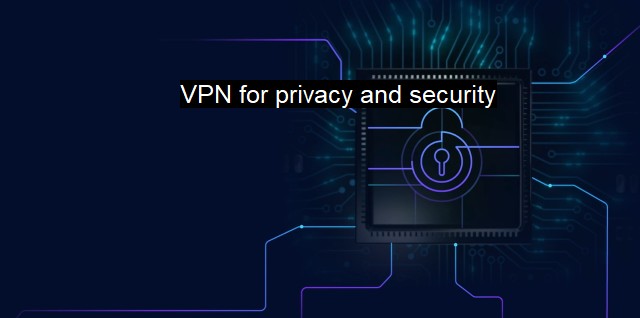What is VPN for privacy and security?
Why VPNs are Essential for Privacy, Security, and Accessing Geo-Restricted Content
In the modern world, the use of the Internet has become an indispensable part of our daily lives. Not only is it a key catalyst for globalization, but also a primary platform where people execute various activities, including commerce, socialization, education, and more. the rapid advancement in web technology has significantly escalated security threats with hackers having a wider field to play on. To protect their data from these cyber threats, many Internet users are turning to a Virtual Private Network (VPN) – a fundamental tool in cybersecurity and privacy.Understanding VPN
To grasp what VPN for privacy and security is, it's important to comprehend VPN first. A VPN is an innovative technology that creates a safe and encrypted connection over a less secure network such as the Internet. the VPN masks your Internet Protocol (IP) address to ensure it appears like you're browsing from a different physical location than the real one. This IP address masking enables the Internet user to evade censorship, be anonymous online, access geo-blocked content, and most importantly, keep their engagements private and secure.
VPNs were historically used by businesses to enable remote employees to access the company's local network securely. as the Internet hosts grew increasingly enormous, their appeal expanded to ordinary web users, most of who use them for privacy and security.
VPN for Privacy
Privacy while surfing the Internet has become a priority for almost every individual in the world. This preference is understandable, given the digital era's current alarming rates of privacy invasion. Thanks to a VPN's IP mask feature, it increases privacy by keeping spying eyes away. It's this capability to obscure users' web habits, locations, and other personal data from Internet Service Providers (ISPs), cybercriminals, advertisers, and even governments that essentially paint VPN as a tool for privacy.
VPN for Security
While the privacy aspect garners an equal amount of attention, most users employ VPNs primarily for cybersecurity. A good VPN integrates powerful encryption techniques to secure data that flows between the user's device and the Internet. This encrypted tunnel prevents hackers, who often lurk in less secure internet connections such as public Wi-Fi, from intercepting and deciphering the data.
VPN prevents occurrences known as Man-In-The-Middle Attacks, a type of eavesdropping where cybercriminals get unauthorized access to confidential data passed between two parties. This type of attacks is common in unsecured platforms like public networks and they can lead to losses, especially when the data involved is financial-related information.
Conclusion
The integration of VPN for privacy and security in cybersecurity significantly improves a user's online experience, allowing them to surf the internet freely and safely. While using a VPN does not guarantee absolute protection from cyber threats—it would still be prudent to complement it with antivirus software— the opportunity to minimize vulnerability provided by VPNs extends a noteworthy degree of control back to users. It primarily focuses on preserving netizens' web privacy and security and serves as a testament to the perpetual cacophony of innovation aimed at combating cryptic cyberspace threats.
Suppose these threats evolve as technology progresses, which is unquestionably plausible, having a VPN would be an immensely practical security addition. Therefore, in this era of escalating cyber threats, adopting a VPN for privacy and security has transitioned from being a mere option to become an absolute necessity, pivotal for anyone seeking to keep their online engagements safe, private, and controlled.

VPN for privacy and security FAQs
What is a VPN and how does it protect my privacy and security?
A VPN, or Virtual Private Network, creates an encrypted connection between your device and a remote server, masking your IP address and online activity from prying eyes. This shields your data and browsing history from potential hackers, internet service providers, and any third-party tracking attempts.Is a VPN legal and safe to use for privacy and security?
Yes, VPNs are legal in most countries, but it's always best to check your local laws. Using a reputable VPN service is safe, as long as you choose a trustworthy provider that doesn't log your activity or share your data with third parties.What are the benefits of using a VPN for privacy and security?
A VPN provides several benefits for online privacy and security, including: protecting your sensitive data from interception and hacking, encrypting your internet traffic, hiding your IP address and geolocation, bypassing internet censorship and geo-restrictions, and preventing third-party tracking and targeted advertising.How do I choose the best VPN for privacy and security?
The best VPN for privacy and security should have the following features: strong encryption protocols, a no-logging policy, a wide range of server locations, fast connection speeds, user-friendly apps, and reliable customer support. Always do your research and read reviews before choosing a VPN.| | A | | | B | | | C | | | D | | | E | | | F | | | G | | | H | | | I | | | J | | | K | | | L | | | M | |
| | N | | | O | | | P | | | Q | | | R | | | S | | | T | | | U | | | V | | | W | | | X | | | Y | | | Z | |
| | 1 | | | 2 | | | 3 | | | 4 | | | 7 | | | 8 | | |||||||